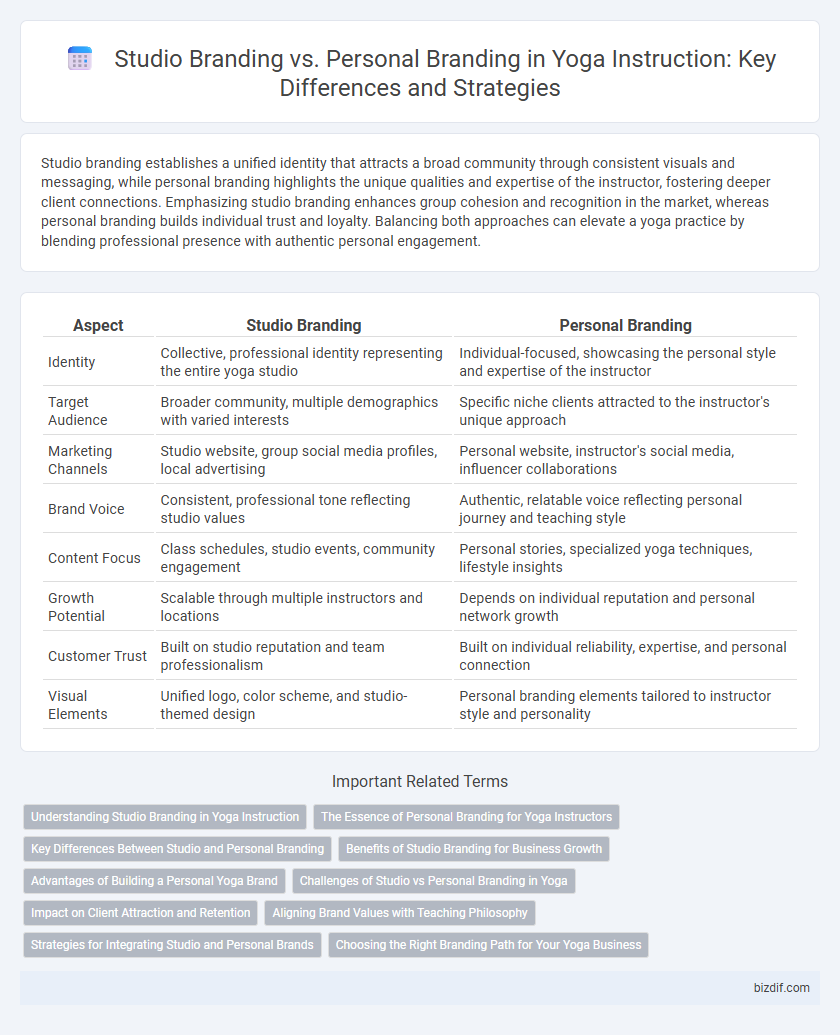Studio branding establishes a unified identity that attracts a broad community through consistent visuals and messaging, while personal branding highlights the unique qualities and expertise of the instructor, fostering deeper client connections. Emphasizing studio branding enhances group cohesion and recognition in the market, whereas personal branding builds individual trust and loyalty. Balancing both approaches can elevate a yoga practice by blending professional presence with authentic personal engagement.
Table of Comparison
| Aspect | Studio Branding | Personal Branding |
|---|---|---|
| Identity | Collective, professional identity representing the entire yoga studio | Individual-focused, showcasing the personal style and expertise of the instructor |
| Target Audience | Broader community, multiple demographics with varied interests | Specific niche clients attracted to the instructor's unique approach |
| Marketing Channels | Studio website, group social media profiles, local advertising | Personal website, instructor's social media, influencer collaborations |
| Brand Voice | Consistent, professional tone reflecting studio values | Authentic, relatable voice reflecting personal journey and teaching style |
| Content Focus | Class schedules, studio events, community engagement | Personal stories, specialized yoga techniques, lifestyle insights |
| Growth Potential | Scalable through multiple instructors and locations | Depends on individual reputation and personal network growth |
| Customer Trust | Built on studio reputation and team professionalism | Built on individual reliability, expertise, and personal connection |
| Visual Elements | Unified logo, color scheme, and studio-themed design | Personal branding elements tailored to instructor style and personality |
Understanding Studio Branding in Yoga Instruction
Studio branding in yoga instruction centers on creating a cohesive identity that reflects the studio's values, atmosphere, and community experience, often visualized through logos, color schemes, and class offerings. This branding strategy aims to attract a broad audience by fostering recognition and trust in the studio as a whole rather than individual instructors. Consistent messaging and a unified aesthetic help establish a strong market presence, encouraging client loyalty and differentiation from competitors.
The Essence of Personal Branding for Yoga Instructors
Personal branding for yoga instructors emphasizes authenticity, personal story, and unique teaching style, creating deeper connections with students. Unlike studio branding, which promotes a collective identity, personal branding highlights the instructor's values, expertise, and presence. This approach fosters trust, loyalty, and a distinct reputation in a competitive yoga market.
Key Differences Between Studio and Personal Branding
Studio branding centers on creating a cohesive identity that reflects the collective values, atmosphere, and services of the yoga facility, appealing to a broad audience. Personal branding emphasizes the individual instructor's unique teaching style, expertise, and personality, fostering a deeper personal connection with students. Key differences include the scope of audience engagement, consistency in visual elements for studios, and authenticity in personal narratives for instructors.
Benefits of Studio Branding for Business Growth
Studio branding creates a unified and professional image that attracts a broader client base and fosters customer trust, ultimately driving business growth. It enhances visibility through consistent marketing efforts and facilitates partnerships with local businesses or wellness communities. Establishing a recognizable studio brand helps differentiate the business in a competitive market and supports scalability by allowing multiple instructors to contribute under one trusted name.
Advantages of Building a Personal Yoga Brand
Building a personal yoga brand fosters authentic connections with students, enhancing trust and loyalty through unique teaching styles and personal stories. It allows instructors to differentiate themselves in a competitive market by showcasing individual expertise, values, and transformation journeys. Personal branding also offers flexibility in marketing across social platforms and can lead to diversified income streams like workshops, retreats, and online courses.
Challenges of Studio vs Personal Branding in Yoga
Studio branding in yoga struggles with creating a cohesive identity that appeals to a broad audience while managing diverse instructor styles and class offerings. Personal branding faces challenges in maintaining authenticity and building trust without the backing of a larger organization, often requiring consistent content creation and audience engagement. Both approaches must navigate the competitive wellness market, but studios emphasize community experience while personal brands rely on individual reputation.
Impact on Client Attraction and Retention
Studio branding creates a consistent, professional environment that attracts a broad client base by emphasizing collective identity and amenities, enhancing client retention through a trusted community experience. Personal branding highlights an instructor's unique style, expertise, and personality, fostering deeper individual connections that drive client loyalty and word-of-mouth referrals. Balancing both strategies maximizes reach and engagement, ensuring sustainable growth and long-term client commitment in the competitive yoga market.
Aligning Brand Values with Teaching Philosophy
Aligning studio branding with a teaching philosophy ensures a cohesive message that resonates with students seeking a specific yoga experience. Personal branding allows instructors to showcase unique approaches and authentic values, creating deeper connections and trust. Harmonizing both branding strategies strengthens identity, attracts ideal clients, and fosters a loyal community rooted in shared principles and mindfulness.
Strategies for Integrating Studio and Personal Brands
Integrating studio and personal brands in yoga instruction requires aligning core values, visual identities, and messaging to create a cohesive experience that resonates with clients. Emphasizing unique instructor qualities within the studio's established brand framework enhances authenticity and trust while maintaining professional consistency. Leveraging social media platforms to showcase both the studio environment and individual instructors' expertise amplifies reach and fosters community engagement effectively.
Choosing the Right Branding Path for Your Yoga Business
Choosing the right branding path for your yoga business hinges on aligning your goals with your target audience; studio branding emphasizes creating a collective identity that appeals to a broad community, while personal branding highlights your unique teaching style and values. Studio branding leverages consistency in logo, colors, and messaging to build trust and recognition across locations, ideal for expansion and group cohesion. Personal branding offers authenticity and deeper connections with students, fostering loyalty through storytelling and individual engagement, crucial for independent instructors developing their niche.
Studio branding vs Personal branding Infographic

 bizdif.com
bizdif.com